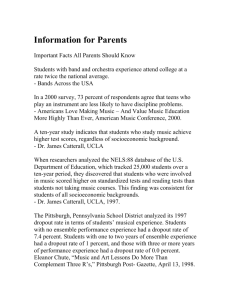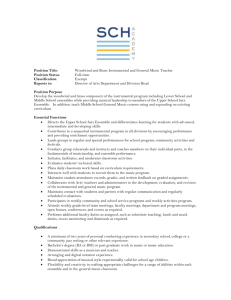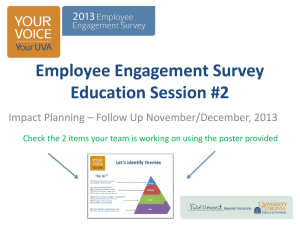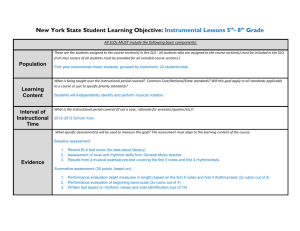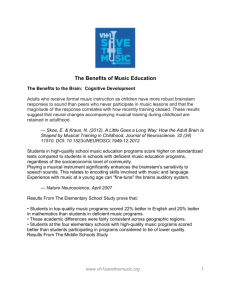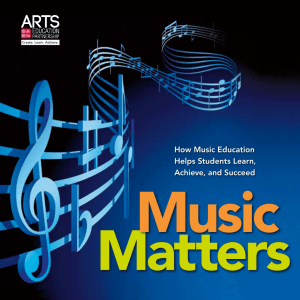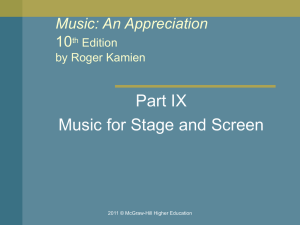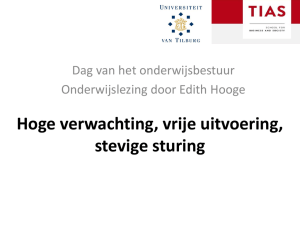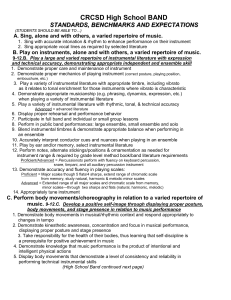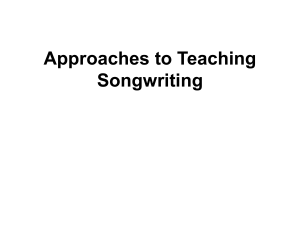Advocacy Statistics
advertisement
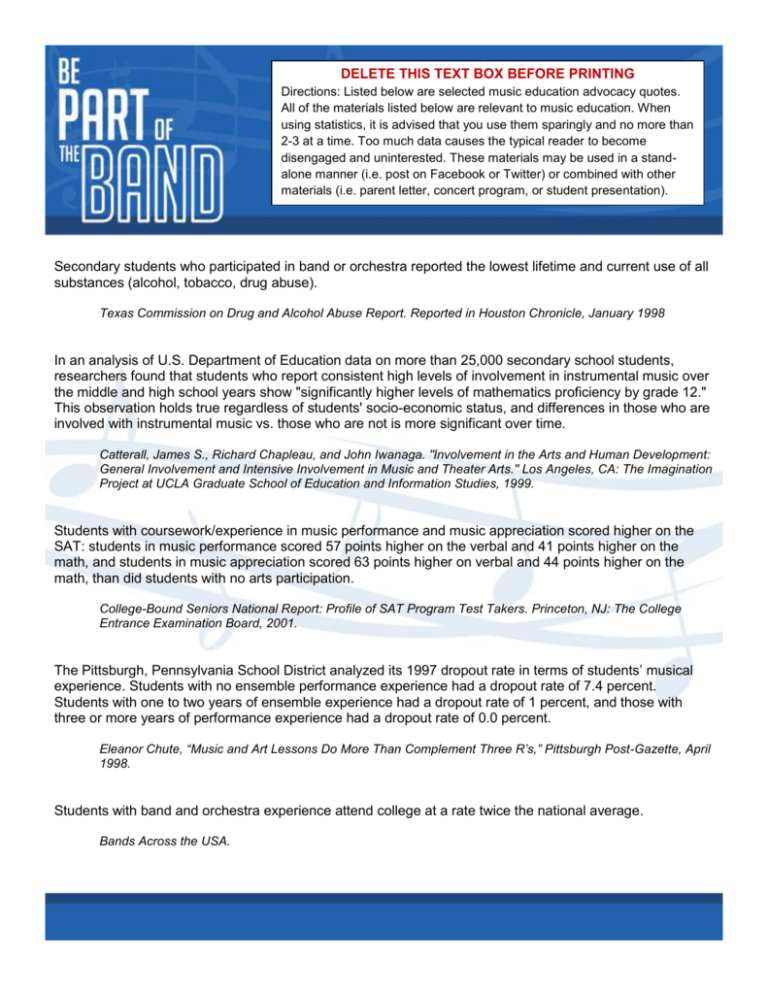
DELETE THIS TEXT BOX BEFORE PRINTING Directions: Listed below are selected music education advocacy quotes. All of the materials listed below are relevant to music education. When using statistics, it is advised that you use them sparingly and no more than 2-3 at a time. Too much data causes the typical reader to become disengaged and uninterested. These materials may be used in a standalone manner (i.e. post on Facebook or Twitter) or combined with other materials (i.e. parent letter, concert program, or student presentation). Secondary students who participated in band or orchestra reported the lowest lifetime and current use of all substances (alcohol, tobacco, drug abuse). Texas Commission on Drug and Alcohol Abuse Report. Reported in Houston Chronicle, January 1998 In an analysis of U.S. Department of Education data on more than 25,000 secondary school students, researchers found that students who report consistent high levels of involvement in instrumental music over the middle and high school years show "significantly higher levels of mathematics proficiency by grade 12." This observation holds true regardless of students' socio-economic status, and differences in those who are involved with instrumental music vs. those who are not is more significant over time. Catterall, James S., Richard Chapleau, and John Iwanaga. "Involvement in the Arts and Human Development: General Involvement and Intensive Involvement in Music and Theater Arts." Los Angeles, CA: The Imagination Project at UCLA Graduate School of Education and Information Studies, 1999. Students with coursework/experience in music performance and music appreciation scored higher on the SAT: students in music performance scored 57 points higher on the verbal and 41 points higher on the math, and students in music appreciation scored 63 points higher on verbal and 44 points higher on the math, than did students with no arts participation. College-Bound Seniors National Report: Profile of SAT Program Test Takers. Princeton, NJ: The College Entrance Examination Board, 2001. The Pittsburgh, Pennsylvania School District analyzed its 1997 dropout rate in terms of students’ musical experience. Students with no ensemble performance experience had a dropout rate of 7.4 percent. Students with one to two years of ensemble experience had a dropout rate of 1 percent, and those with three or more years of performance experience had a dropout rate of 0.0 percent. Eleanor Chute, “Music and Art Lessons Do More Than Complement Three R’s,” Pittsburgh Post-Gazette, April 1998. Students with band and orchestra experience attend college at a rate twice the national average. Bands Across the USA. Music students out-perform non-music students on achievement tests in reading and math. Skills such as reading, anticipating, memory, listening, forecasting, recall, and concentration are developed in musical performance, and these skills are valuable to students in math, reading, and science. B. Friedman, “An Evaluation of the Achievement in Reading and Arithmetic of Pupils in Elementary School Instrumental Music Classes,” Dissertation Abstracts International. One in three of today’s school-aged children will hold an arts-related job at some time in his or her career. Education Commission on the States. The College Board, in a publication about college admissions, states, “Preparation in the arts will be valuable to college entrants whatever their intended field of study.” Academic Preparation for College: What Students Need To Know and Be Able To Do, The College Board A 1997 Gallup Survey on Americans’ attitudes toward music revealed that 89% of respondents believe music helps a child’s overall development, and 93% believe that music is part of a well-rounded education. Americans’ Attitudes Toward Music, The Gallup Organization, 1997. According to a 2000 survey, eighty-one (81) percent of people responding believe that participating in school music corresponds with better grades and test scores. This is an increase of fourteen (14) percent over the 1997 results for the same question. Attitudes, NAMM (International Music Products Association), 2000. More music teachers are role models for minority students than teachers of any other subject. Thirty-six (36) percent of surveyed minority students identified music teachers as their role models, compared to twentyeight (28) percent for English teachers, eleven (11) percent for elementary teachers, and seven (7) percent for physical education teachers. “Music teachers as role models for African-American students,” Journal of Research in Music Education,1993. Researchers at the University of California and the Niigata Brain Research Institute in Japan have found an area of the brain that is activated only when reading musical scores. “Musical Brain – Special Brain Area Found for Reading Music Scores,” NeuroReport, 1998. Ninety-two (92) percent of people who play an instrument say they were glad they learned to do so, according to a 2000 Gallup Poll. Gallup Poll Shows Strong Support for Putting Music in Every School’s Curriculum, Giles Communications, 2000. In academic situations, students in music programs are less likely to draw unfounded conclusions. Champions of Change, Federal study, 1999. Nine out of ten adults and teenagers who play instruments agree that music making brings the family closer together. Music Making and Our Schools, American Music Conference, 2000. The arts are one of the six subject areas in which the College Board recognizes as essential in order to thrive in college. Academic Preparation for College: What Students Need to Know and Be Able to Do, 1983 [still in use], The College Board, New York According to the National Education Longitudinal Study of 1988, music students received more academic honors and awards than non-music students. A higher percentage of music participants received As, As/Bs, and Bs than non-music participants. NELS:88 First Follow-up, 1990, National Center for Education Statistics, Washington D.C. Lewis Thomas, physician and biologist, found that music majors comprise the highest percentage of accepted medical students at 66%. “The Case for Music in the Schools,” Phi Delta Kappan, February 1994. Research made between music and intelligence concluded that music training is far greater than computer instruction in improving children’s abstract reasoning skills. Shaw, Rauscher, Levine, Wright, Dennis and Newcomb, “Music training causes long-term enhancement of preschool children’s spatial-temporal reasoning,” Neurological Research, vol. 19, February 1997 “The arts enrich communities and employees, and also stimulate the kind of intellectual curiosity our company needs to stay competitive.” Norma R. Augustine, Chairman and Chief Executive Officer, Martin Marietta Corporation.
